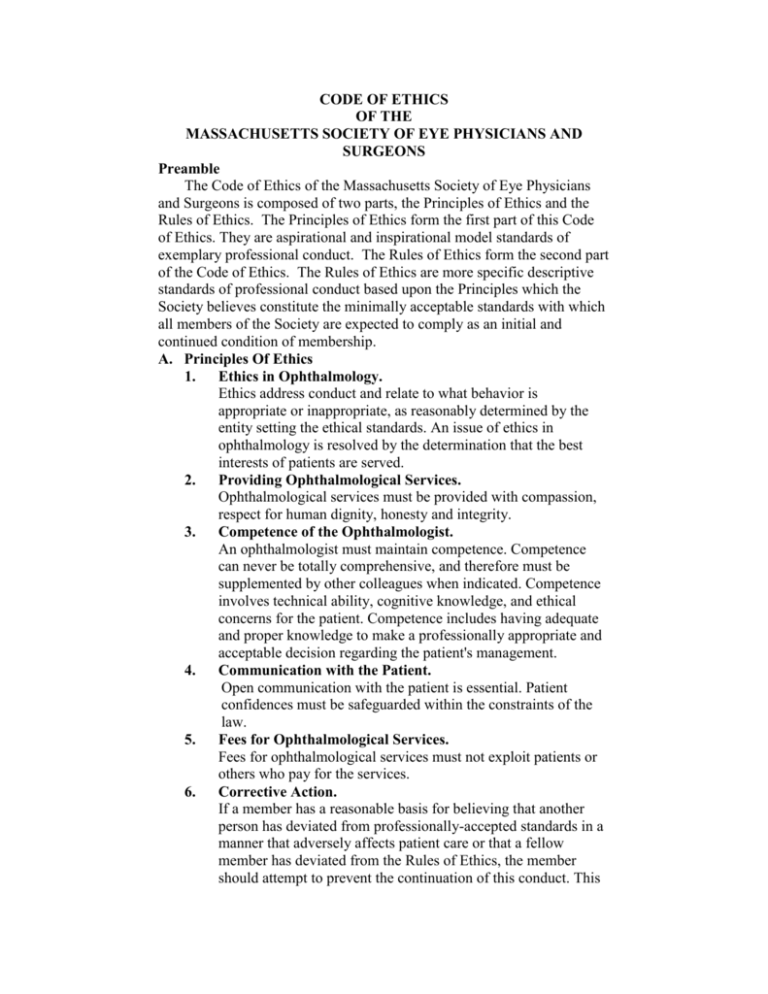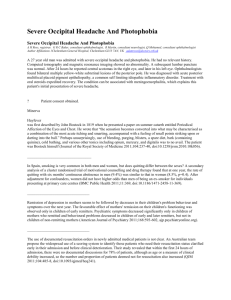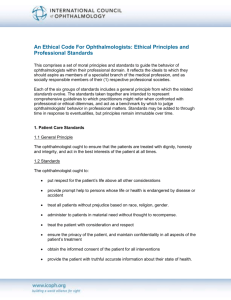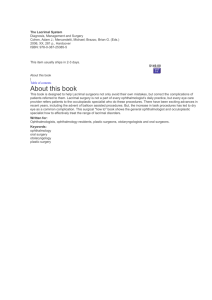CODE OF ETHICS
advertisement

CODE OF ETHICS OF THE MASSACHUSETTS SOCIETY OF EYE PHYSICIANS AND SURGEONS Preamble The Code of Ethics of the Massachusetts Society of Eye Physicians and Surgeons is composed of two parts, the Principles of Ethics and the Rules of Ethics. The Principles of Ethics form the first part of this Code of Ethics. They are aspirational and inspirational model standards of exemplary professional conduct. The Rules of Ethics form the second part of the Code of Ethics. The Rules of Ethics are more specific descriptive standards of professional conduct based upon the Principles which the Society believes constitute the minimally acceptable standards with which all members of the Society are expected to comply as an initial and continued condition of membership. A. Principles Of Ethics 1. Ethics in Ophthalmology. Ethics address conduct and relate to what behavior is appropriate or inappropriate, as reasonably determined by the entity setting the ethical standards. An issue of ethics in ophthalmology is resolved by the determination that the best interests of patients are served. 2. Providing Ophthalmological Services. Ophthalmological services must be provided with compassion, respect for human dignity, honesty and integrity. 3. Competence of the Ophthalmologist. An ophthalmologist must maintain competence. Competence can never be totally comprehensive, and therefore must be supplemented by other colleagues when indicated. Competence involves technical ability, cognitive knowledge, and ethical concerns for the patient. Competence includes having adequate and proper knowledge to make a professionally appropriate and acceptable decision regarding the patient's management. 4. Communication with the Patient. Open communication with the patient is essential. Patient confidences must be safeguarded within the constraints of the law. 5. Fees for Ophthalmological Services. Fees for ophthalmological services must not exploit patients or others who pay for the services. 6. Corrective Action. If a member has a reasonable basis for believing that another person has deviated from professionally-accepted standards in a manner that adversely affects patient care or that a fellow member has deviated from the Rules of Ethics, the member should attempt to prevent the continuation of this conduct. This B. is best done by communicating directly with the other person. When that action is ineffective or is not feasible, the member has a responsibility to evaluate whether legal duties or professional ethics require further action. 7. An Ophthalmologist's Responsibility. It is the responsibility of an ophthalmologist to act in the best interest of the patient. Rules of Ethics 1. Competence. An ophthalmologist is a physician who is educated and trained to provide medical and surgical care of the eyes and related structures. An ophthalmologist should perform only those procedures in which the ophthalmologist is competent by virtue of specific training or experience or is assisted by one who is. An ophthalmologist must not misrepresent credentials, training, experience, ability, or results. 2. Informed Consent. The performance of medical or surgical procedures shall be preceded by appropriate informed consent. 3. Clinical Experiments and Investigative Procedures. Use of clinical experiments or investigative procedures shall be approved by adequate review mechanisms. Clinical experiments and investigative procedures are those conducted to develop adequate information on which to base prognostic or therapeutic decisions or to determine etiology or pathogenesis, in circumstances in which insufficient information exists. Appropriate informed consent for these procedures must recognize their special nature and ramifications. 4. Other Opinions. Additional opinion(s) shall be obtained if requested by the patient. Consultation(s) shall be obtained if required by the condition. 5. The Impaired Ophthalmologist. A physically, mentally or emotionally impaired ophthalmologist should withdraw from those aspects of practice affected by the impairment. If the ophthalmologist does not withdraw, it is the duty of other ophthalmologists who know of the impairment to take action to assure withdrawal of the impaired ophthalmologist. 6. Preoperative Assessment. Surgery shall be recommended only after a careful consideration of the patient’s physical, social, emotional and occupational needs. The preoperative work-up must document the indications for surgery. Performance of unnecessary surgery is an extremely serious ethical violation. 7. Delegation of Services. Delegation is the use of auxiliary health care personnel to provide eye care services for which the ophthalmologist is responsible. An ophthalmologist must not delegate to an auxiliary those aspects of eye care within the unique competence of the ophthalmologist. When other aspects of eye care for which the ophthalmologist is responsible are delegated to an auxiliary, the auxiliary must be qualified and adequately supervised. An ophthalmologist may make different arrangements for the delegation of eye care in special circumstances, such as emergencies, if the patient’s welfare and rights are placed above all other considerations. 8. Postoperative Care. The providing of postoperative eye care until the patient has recovered is integral to patient management. The operating ophthalmologist should provide those aspects of postoperative eye care within the unique competence of the ophthalmologist (which do not include those permitted by law to be performed by auxiliaries). Otherwise, the operating ophthalmologist must make arrangements before surgery for referral of the patient to another ophthalmologist, with the patient’s approval and that of the other ophthalmologist. The operating ophthalmologist may make different arrangements for the provision of those aspects of postoperative eye care within the unique competence of the ophthalmologist in special circumstances, such as emergencies or when no ophthalmologist is available, if the patient’s welfare and rights are placed above all other considerations. 9. Medical and Surgical Procedures. An ophthalmologist must no misrepresent the service that is performed or the charges made for that service. 10. Procedures and Materials. Ophthalmologists should order only those laboratory procedures, optical devices or pharmacological agents that are in the best interest of the patient. Ordering unnecessary procedures or material for pecuniary gain is unethical. 11. Commercial Relationships. An ophthalmologists clinical judgment and practice must not be affected by economic interest in, commitment to, or benefit from professionallyrelated commercial enterprises. 12. Communication to Colleagues. Communication to colleagues on research including clinical investigations must be accurate and truthful. Appropriate disclosure of commercial interest is required. 13. Communication to the Public. Communications to the public must be accurate,. They must not convey false, untrue, deceptive, or misleading information through statements, testimonials, photographs, graphics or other means. They must not omit material information without which the communications would be deceptive. Communications must not appeal to an individual’s anxiety in an excessive or unfair way: and they must not create unjustified expectations of results. If communications refer to benefits or other attributes of ophthalmic procedures that involve significant risks, realistic assessments of their safety and efficacy must also be included, as well as the availability of alternatives and, where necessary to avoid deceptions, descriptions and/or assessments of the benefits or other attributes of those alternatives. Communications must not misrepresent an ophthalmologist’s credentials, training, experience or ability, and must not contain material claims of superiority that cannot be substantiated. If a communication results from payment by an ophthalmologist, this must be disclosed unless the nature, format or medium makes it apparent. 14. Interrelations Between Ophthalmologists. Interrelations between ophthalmologists must be conducted in a manner that advances the best interests of the patient, including the sharing of relevant information. 15. Conflict of Interest. A conflict of interest exists when professional judgment concerning the well-being of the patient has a reasonable chance of being influenced by other interests of the provider. Disclosure of a conflict of interest is required in communications to patients, the public, and colleagues. 16. Expert Testimony. Expert testimony should be provided in an objective manner using medical knowledge to form expert medical opinions. Nonmedical factors (such as solicitation of business from attorneys, competition with other physicians, and personal bias unrelated to professional expertise) should not bias testimony. It is unethical for a physician to accept compensation that is contingent upon the outcome of litigation. False, deceptive or misleading expert testimony is unethical.









